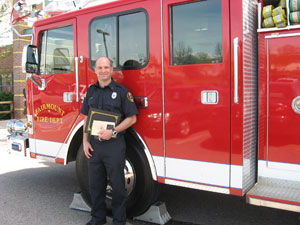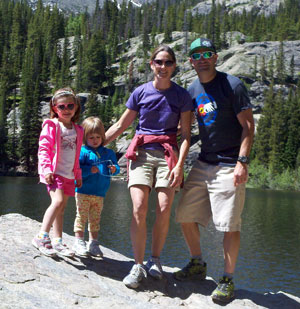 My name is Dirk Butters and I am an active 46 year old living in Golden, Colorado. Though my daytime work is primarily centered around Information Technology, I am also a volunteer firefighter, a recreational hockey player and an avid mountain biker.
My name is Dirk Butters and I am an active 46 year old living in Golden, Colorado. Though my daytime work is primarily centered around Information Technology, I am also a volunteer firefighter, a recreational hockey player and an avid mountain biker.
Approximately ten years ago, I saw an orthopedic surgeon about some frequent shoulder pain I was experiencing in my right shoulder. I was diagnosed as having moderate to severe osteoarthritis and was told I was ultimately going to need a total shoulder replacement (TSR). The joint was injected with some cortisone and I was given some exercises to generally stay away from but not really given much of an alternative other than wait until the pain was too bad to take anymore.
It then became a roller coaster of on and off pain outbreaks. Some weeks or months were worse than others but it would typically calm down enough that I was able to maintain an active lifestyle aided by anti-inflammatory medication and ice. That all changed a year ago when I noticed my shoulder was flaring up again but this time ice and anti-inflammatory medication wouldn’t help calm it down.
 I went back to see the surgeon for a follow-up and possibly another steroid injection where they said, “the shoulder was beyond help and the time for total shoulder replacement was now.” After researching the TSR pros and cons I just couldn’t bring myself to have one yet at my age. I wanted to continue fire fighting and have two small children – I knew that procedure wasn’t an acceptable option for me yet.
I went back to see the surgeon for a follow-up and possibly another steroid injection where they said, “the shoulder was beyond help and the time for total shoulder replacement was now.” After researching the TSR pros and cons I just couldn’t bring myself to have one yet at my age. I wanted to continue fire fighting and have two small children – I knew that procedure wasn’t an acceptable option for me yet.
Over time, the pain worsened and I became very limited with my activities and was also becoming severely depressed. The thought of a TSR caused frequent panic attacks so I decided to just “live with the pain” and continue along as best as possible. Experiencing that much daily pain without a break became overwhelming, so I sought multiple second opinions. When they saw the size of the main osteophyte in an X-Ray, it tested each doctor’s bedside manner. They all said I needed a new shoulder to get any sort of pain relief as soon as possible.
After that, I considered scheduling a TSR because I was no longer able to bear the pain. Upon discussing this decision with a friend, he told me about someone who had badly damaged their shoulder snowboarding at a young age yet they were still extremely active and comfortable after the repair. I contacted them and they said to look no farther than Dr. Peter J. Millett in Vail, Colorado. They told me that he was among the most respected shoulder surgeons in the country and that I needed to get a consultation with him immediately before taking any more steps.
I browsed Dr. Millett’s website and after reading all the positive testimonials, I contacted him right away. He immediately emailed me back telling me he was sorry to hear about my shoulder but he had some potential options he would like to discuss. He requested an MRI in addition to the X-Rays I sent over. After looking at the MRI he called me and said he thought his Comprehensive Arthroscopic Management (CAM) procedure may bring me some relief while still preserving my active lifestyle. He observed in the MRI that there was a lot more bothering my shoulder than simply osteoarthritis. I then drove up for an in-person consultation. After meeting Dr. Millett and his top notch team, and hearing him say with a pleasant smile “I’ve seen worse”, I decided that CAM was a viable option and that he was the right surgeon for me.
I had experienced prior arthroscopic debridement procedures attempting to provide some pain relief but none of them worked for very long. The CAM procedure is not that same surgery. Even though Dr. Millett had mastered large portions of this procedure using arthroscopic instruments, pay careful attention to the initial “C” in the CAM acronym… COMPREHENSIVE!
Due to the variety of procedures combined into one, the pain post-op is real. I’m passing this along because I struggled a bit early on and I don’t want anyone to feel discouraged. This was a significant surgical effort by Dr. Millett to care for my severely degenerative shoulder so the recovery was bound to be challenging. My shoulder also had routinely experienced a great deal of inflammation prior to the surgery so it was bound to happen again afterwards.
They managed my pain well but once I began the strict physical therapy that Dr. Millett requires of all his patients, I felt like I may have been experiencing more pain than some of the TSR patients around me at PT. My therapist reminded me that most of the painful parts of their shoulders had been completely removed. The CAM procedure keeps your natural parts in place to avoid the potential challenges that come with a prosthetic down the road. He also restored nearly all of my range of motion so I was using and stretching muscles and tendons that I hadn’t been in almost ten years! After three months I knew I didn’t have the same shoulder and after four months I knew my shoulder was continuing to improve because I no longer felt depressed.
 Recovering from a major procedure like CAM can feel confusing because recovery pain can feel similar to pre-surgery pain causing you to question if the surgery worked. I suggest writing down a of list of things you were unable to do prior to CAM then reviewing it later. I went for a road bike ride at my three month mark and never experienced the debilitating pain like I did prior to CAM where it felt like my shoulder was filling up with painful concrete. I was so excited that I called my wife and let her know I was going to ride longer than I originally expected!
Recovering from a major procedure like CAM can feel confusing because recovery pain can feel similar to pre-surgery pain causing you to question if the surgery worked. I suggest writing down a of list of things you were unable to do prior to CAM then reviewing it later. I went for a road bike ride at my three month mark and never experienced the debilitating pain like I did prior to CAM where it felt like my shoulder was filling up with painful concrete. I was so excited that I called my wife and let her know I was going to ride longer than I originally expected!
I haven’t reached the 6-8 month mark yet which typically constitutes a full recovery but I’ve already asked to be reinstated in my fire department since I’m feeling so much better. As far I’m concerned, Dr. Millett and his team saved my outlook on life and I can’t thank them enough. My only regret is that I didn’t find out about CAM ten years earlier. I know what it’s like to find yourself feeling abandoned between a simple shoulder debridement and a total shoulder replacement but thank goodness Dr. Millett does too!
Written by Dirk Butters
While clinical studies support the effectiveness of these procedures, individual results may vary. There are no guarantees of outcome. All surgeries involve the risk of major complications. Before you decide on surgery, discuss treatment options with your doctor. Understanding the risks of each treatment can help you make the best decision for your individual situation. Always ask your doctor about all treatment options, as well as their risks and benefits. Only your doctor can determine the appropriate treatment for your situation. The clinical information and opinions, including any inaccuracies expressed in this material by patients or doctor are not necessarily those of Peter Millett, MD and should not be considered as substitute for medical advice provided by your doctor.
